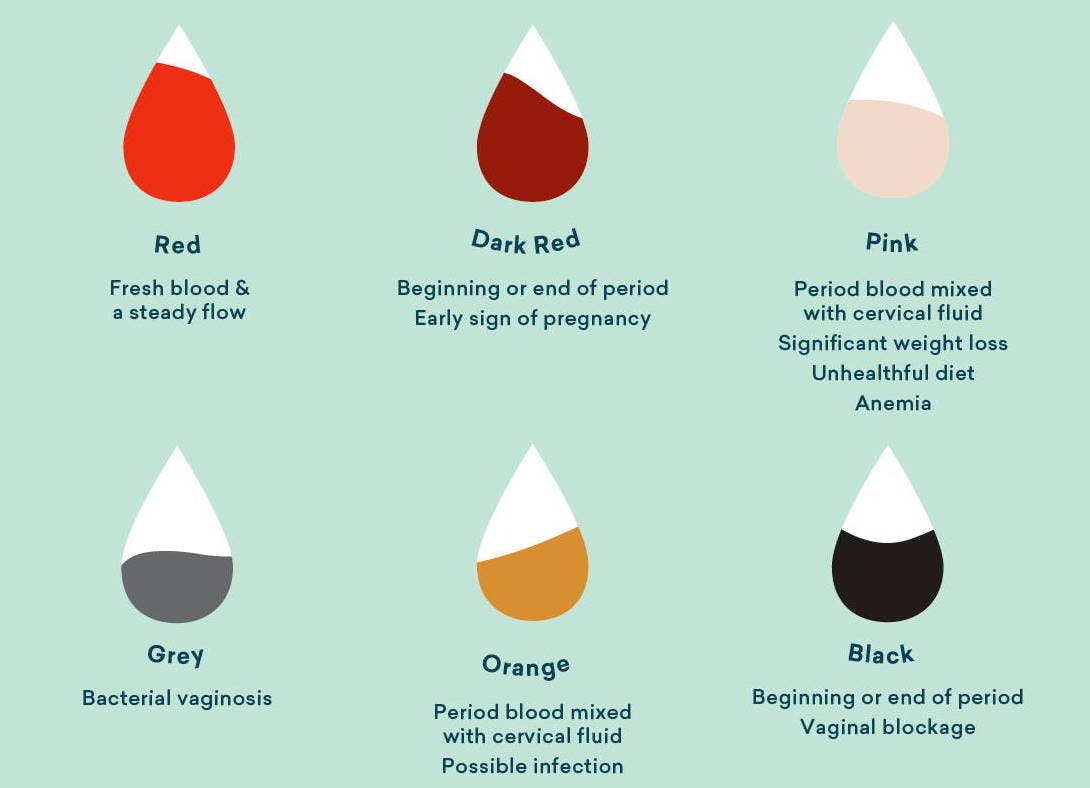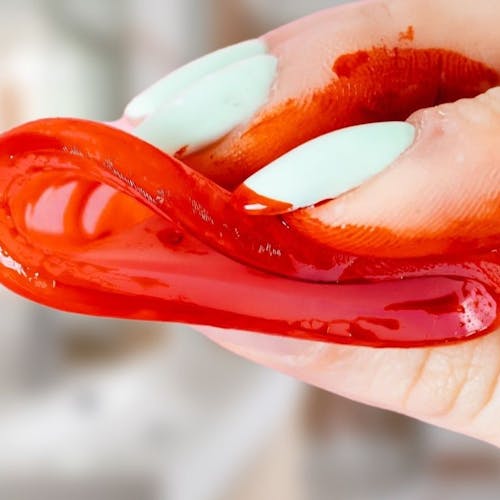This website uses cookies to enhance the user experience. By using Yoppie you are agreeing to our use of cookies.
Clues In The Hue: What Does The Colour Of Your Period Blood Mean?
Written by Yoppie
27 Jan 2020
Bright Red
Dark Red
Brown
Black
Pink
Grey
Have you ever noticed the rainbow of different colours that can emerge from your vagina during your period?! Paying attention to these can be beneficial, as the colour of your period blood can actually indicate crucial health information. While period blood is known for being red, it can vary in its strength of colour, and even the colour itself. Let’s take a closer look.

Bright Red
Period blood is known for being bright red, so this is pretty average, and indicates a steady flow of fresh blood. At the beginning and middle of your period you will likely see bright red blood, and possibly some darker red towards the end.
Very vividly bright red blood, if it is particularly heavy or accompanied by clots (where the blood comes out in lumps), can sometimes be a sign of polyps or fibroids. These are non-cancerous growths that can occur in the uterus and cause women to experience a heavy flow during their period, and possibly even pain. If you experience untoward pain or believe something is abnormal about your cycle, always chat to your GP so they can make sure everything is A-OK.
Dark Red
Dark red blood is also nothing to worry about, and is very common, especially when you first wake up in the morning. This is because when you have been lying down for a while the blood collects, ready to be expelled when you stand upright. The darkness in colour simply means the blood has oxidised inside the uterus, and you are more likely to notice dark red blood when your period cycle is coming to an end - this is ‘old blood’ leaving the body.
Another reason for vaginal blood to be dark red is if you have recently given birth, and this is called ‘lochia’. We have a whole blog on lochia and what to expect, here.
Brown
Just as dark red blood is a sign that the blood has oxidised, blood that is brown means it is older, and more likely to signal the end of your period. Alternatively, if you tend to experience a very slow flow each month, blood could be taking longer to pass through your system, therefore having more time to oxidise and turn to a darker shade of red or even brown.
Black
Black blood can look a little alarming, but it doesn’t always mean there’s anything wrong. This is usually just very old blood that has taken a long time to pass through your system, and therefore has oxidised to the degree that it has turned black - this can look similar to coffee grounds in appearance.
Pink
Period blood can take on a pink tint when it mixes with cervical fluid, which can sometimes happen at the start or end of your period as your discharge changes and dilutes the blood. If you use hormonal birth control such as the pill or the implant, you may notice some spotting or pink-stained discharge at other times of your cycle. It can be a bit of a nuisance, and typically settles after you have been taking the contraception for more than 3 months, however if it is bothersome, speak with your doctor or sexual health clinic.
You might also experience pink or bloody discharge after sex, as sometimes intercourse can leave you with small tears in the vagina or cervix that heal on their own. Blood from these tears mixes with fluid in your vagina, and leaves the body looking like pink discharge. However, it is important that you don’t ignore bleeding after sex as it can sometimes occur if there's a more sinister underlying cause like cervical cancer.
Orange
Orange blood?! Yup. Probably the rarest of the colours, and not one that gets talked about a lot. Just as blood can mix with cervical fluid and appear pink, if you have an infection in the vagina it can mix with the coloured discharge and even look orange. Possible infections include bacterial vaginosis, or sexually transmitted diseases like chlamydia. If you also notice bad smelling discharge or vaginal itching alongside orange period blood, you should discuss your symptoms with your doctor to make sure everything is as it should be.
Grey
Another colour that sounds like cause for concern, but isn’t always: grey blood. More like discharge in consistency, grey blood can be a sign of bacterial vaginosis. Remember that if you experience itching in and around your vagina, any smelly vaginal odour, or a burning sensation when you use the toilet, you should definitely chat to your GP about possible causes and getting started on the necessary antibiotics to treat the condition.
Your period is often an indication of your overall health, so aside from colour changes, watch out for changes in texture, length, heaviness, consistency or size of clots. Keeping an eye on what’s normal and what doesn’t seem right is key, so you can chat to your doctor about how to stay as healthy as possible.
Have you ever experienced unusual colours in your period blood? It’s sharing time! Head on over to our private Facebook group or drop us a note on Insta @itsyoppie. Don't forget that our personalised period subscription box can get organic tampons, PMS supplements and more delivered easily and regularly through your letterbox. That's one less thing to keep an eye on.
Additional References
Faculty of Sexual and Reproductive Healthcare. Management of Unscheduled Bleeding in Women Using Hormonal Contraception.
Bilardi JE, Walker S, Temple-Smith M, et al. The burden of bacterial vaginosis: women’s experience of the physical, emotional, sexual and social impact of living with recurrent bacterial vaginosis. PLoS One 2013; 8: e74378.
https://www.medicalnewstoday.com/articles/324848#clots
Fact checked by Doctor Samantha Miller.
Section jump
Back to top
Subscribe To Our Newsletter
YOPPIE





© 2025 Yoppie is a registered trademark of Phlo Technologies Ltd.
Yoppie's supplements are not a substitute for a varied diet and healthy lifestyle and are not intended to diagnose, treat, or cure any disease. If you are pregnant, breastfeeding, have a medical condition or are under medical supervision, please consult with your doctor before taking any of our products.






